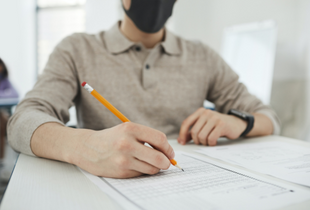Final Exams: A Marathon to the End
 Written by: Jenny Gao, 3rd Year Biochemistry + Cell Biology
Written by: Jenny Gao, 3rd Year Biochemistry + Cell Biology
Photo by: Adobe Stock
The taste of peppermint hot chocolates, the smell of fresh pine, and the drastic change in the weather towards a bone-chilling temperature can only mean one thing, winter exams are just around the corner. As much as I would love to hide for an indefinite amount of time behind that wall from studying for my exams, I know that studying earlier rather than later for final exams will be crucial for both my physical and mental well-being. Preparing for final exams is truly like running a marathon – slow, well-prepared, and steady will win the race. I think the best way to prep for exams is to focus on tasks and goals in chronological order.
The Start:
To begin preparing for exams, I will first start by figuring out my exam schedule from the Office of the Registrar and plan them out in my calendar. I buy the large paper calendar posters from the Western Bookstore and plan out the entire month leading up to my final exams. In addition to final exams, I will also add any outstanding lectures and classes that I have left, as well as any final assignments that are due into the calendar.
The Planning:
After mapping out all the schoolwork that I need to accomplish leading up to my final exams, I will start to devise a plan to finish or catch up in my lectures and assignments, and then to study for my exams. In the weeks leading up to my final exams, I will work to finish all my assignments early so that I leave myself with enough time to study for exams and can focus solely on them. Then I will carve out a section of time for each course every day to study for my all of my exams. I find that it is best to interleave between the courses to study for. Sometimes it is a nice break after spending 3 hours learning about transcription factors in biology to study about the psychology of infants. I find that interleave studying rewires the focus of the brain because the brain is introduced to a new concept.
Additionally, I make sure to leave room in my calendar for extracurricular work, time to eat and rest, as well as blocks of free time for last-minute assignments and quizzes.
The Execution:
After the pre-planning stages have been completed, I carry out my plans into action. There are a couple of things that I do to ensure that I am doing optimal studying:
- Environment: the location and the ambiance of where I study greatly affect how focused I am on my subjects. I find that I cannot focus when I am working by myself at home, sometimes there are people over, renovations being done, and I have a constant desire to nap. I find that I study the best in a quiet nook at the Weldon or Taylor library. Sometimes, when I want a change of scenery, I will also go to the John Labatt Visual Arts Centre. They’ve got really cool art structures and features on display, giving a very unique ambiance to study in.
- Sleep schedule: in my first- year of university, I thought it would be wise to pull two -all- nighters in a row in order to study for my chemistry and psychology exams. I learned soon enough after I fell asleep during my chemistry exam that sleep is CRUCIAL for both short-term and long-term stamina when preparing and writing for exams. Therefore, I make sure to get adequate sleep the night before when I know that I am going to be studying for a long time the next day.
- Friends: while some people may disagree, I really do love revising and studying for final exams with my friends. Whether that is in silence, or actively studying together writing notes and concepts on a large whiteboard. There are many benefits to studying with a friend or in a group. You will feel supported by proxy of being near someone while studying, and you will also be able to bounce off new ideas and study tips off each other.
Now to studying. Normally how I prepare for my courses depends on the type of material I am learning. If I know the course is very content and memorization heavy, I will review over my notes multiple times, re-watch lectures that I did not understand, and watch additional YouTube videos to familiarize myself with the concept. If I know that the course is more theory and analysis-based, I will go over my notes less, and research practice questions and scenarios to do instead. Overall, I think the key to successful studying is being willing and able to adapt to different study habits for each of the courses.
It is key to take studying for exams one step at a time. Indeed, the ticking time towards final exams and the amount of content we have learned throughout the semester is intimidating, but creating smaller and attainable goals for studying will ultimately encourage and motivate you to keep going until the finish line.
Check out more blogs:

Loving Yourself as a Person But Not a Student? Here’s How to Love Both.
We all face burnout, and it's important to recognize those feelings and take care of ourselves.

4 Pieces of Advice for Finals Season
Johann shares advice for first-year students - and all students - for exam season.

Sleep Now, Work Later
No matter how important you feel school is, sleep is also crucial to your well-being.
Published on

